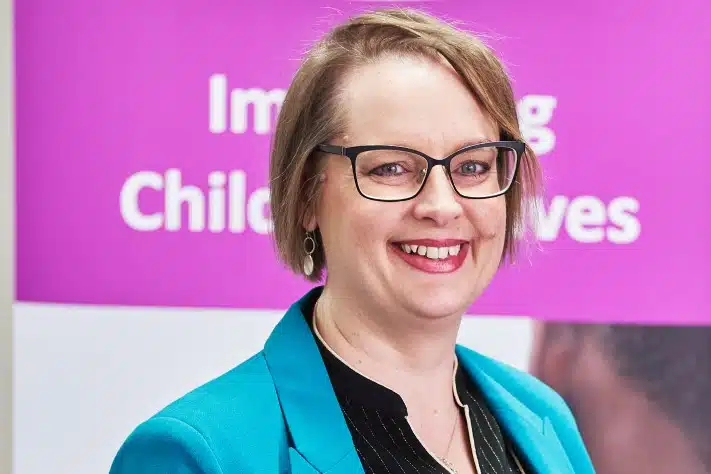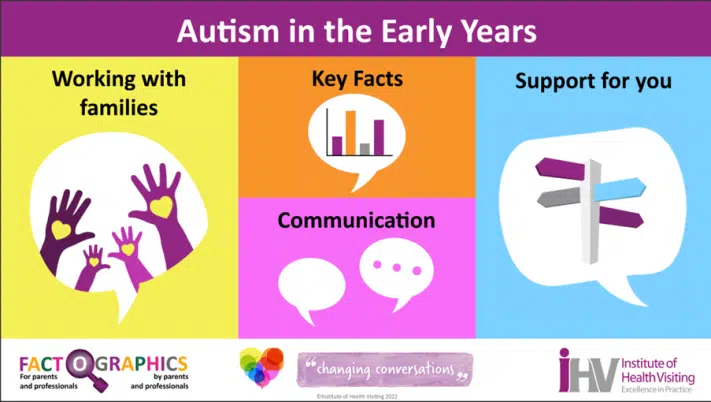31st March 2023
In support of World Autism Acceptance Week (27 March – 2 April 2023), we are delighted to share this Voices blog by Victoria Jackson, Senior Programme Manager – Projects and Evaluation at iHV, on the launch of our new “Autism in the Early Years” Factographic.

This week, the iHV has formally launched a brand new “Factographic” for practitioners and professionals to raise awareness of autism in the early years. This is important, as early identification and support for children with signs of autism not only gives children the best start possible, but also the best chance of developing to their full potential.
This resource was supported by NHS England & NHS Improvement – Learning Disability Nursing, building on the success of our Changing Conversations Ambassador training programme, funded by the Burdett Trust for Nursing. The Factographic forms part of a suite of resources and training programme that has been co-designed with families, health visitors, learning disability nurses, those with lived experience and professionals – it focuses on support to families in the early years and pre-diagnosis.
The new Factographic aims to help those who want to understand autism better, such as parents who may have worries or professionals who have not had experience of working with children in the early years who may have autism. It provides a good start in building understanding, and signposts to quality-assured organisations and resources to expand knowledge as you need to.
Through our co-production approach, clear ‘asks’ were identified to include within the Factographic, including information on what autism is, where to get support, background information, and how to have conversations with families. Those with lived experience expressed the importance of celebrating the positives of autism but also of not ‘shying away’ from the difficulties.
We developed the Factographic based on the successful template used for previous iHV Factographics, as these have been evaluated well by users.
David Harling, National Deputy Director for Learning Disability Nursing, NHS England & NHS Improvement, shares his views on the new Factographic:
“In my capacity as National Lead for learning disability nursing, I am extremely pleased to support the development and launch of the iHV autism in the early years Factographic.
As a learning tool and an interactive resource, the Factographic provides a wealth of really helpful, accessible and visually appealing information to enhance our knowledge and understanding of autism.
As both a learning disability nurse and a mental health nurse, I recognise the impact of developing resources that are coproduced and grounded in people’s lived experience. The Factographic is a credit to the hard work of all involved and it clearly illustrates a number of important considerations to help professionals, as well as families, when thinking about autism in the early years.
Upon first reviewing the Factographic, I was particularly endeared to the subtle way in which the content dispels some of the myths associated with autism, whilst presenting a number of the more common questions in an easy to understand format and content. The videos within the Factographic are excellent and offer some extremely powerful insights and testimony from people with lived experience.
As improvements in the assessment of autism are enhanced and as the number of individuals diagnosed with autism increases, resources like the Factographic will prove invaluable. By presenting the information in such a novel, yet concise, format provides a really useful one-stop shop.
Upon first hearing of the opportunity to develop a Factographic focused on autism in early years, I was delighted to be working with the Institute of Health Visiting. True to form, they have delivered a highly engaging, interactive resource which I am confident will have a significant and lasting impact in practice.”
A little bit more about the Factographic
The Factographic is divided into 4 sections, each addressing the ‘asks’ from families and professionals:
- Working with families
This section further developed what we learnt from the iHV’s original projects on autism (to access the full project insights click here). It aims to support the user to understand the needs of families who have concerns that their child may be autistic, but also the key considerations for professionals when working with children and families where autism may be a possible diagnosis (in the pre-diagnosis phase). It also houses a range of films which share experiences of being autistic or having a child who is autistic. - Key facts
During the co-design period, both parents and professionals said they wanted to know the evidence behind autism, including what the key signs are, dispelling myths, and sharing positive experiences. This section aims to provide insight into these areas. - Communication
How we communicate matters – and everyone’s needs are different. This section aims to help understand how the language we use can affect others and the importance of celebrating the positives about autism. It also aims to support parents and professionals to understand that behaviour is a form of communication and that, by understanding this and what a behaviour may be trying to say, can help prevent unwanted behaviours. You will also find tools to support communication in this section. - Support for you
This section contains signposting resources for parents and professionals to different organisations and tools that may be of help. This includes information about behaviour, the Local Offer, and Continuing Professional Development.
More about our Changing Conversations around Autism project
The Burdett Trust for Nursing also supported the iHV to create resources for reducing the need for restrictive practice and how to better understand behaviour as communication. These resources and training have been incorporated into the Changing Conversations Ambassador Training and toolkit. You can learn more and see our understanding of behaviour animation here .
If you want to know more about our original Changing Conversations project you can read our previous Voices blog: Changing Conversations around autism – #AutismAwarenessWeek .
If you are interested in becoming a Changing Conversations Ambassador and supporting place-based leadership by attending a one-day training and gaining access to a digital toolkit, then contact [email protected] to find out more.



